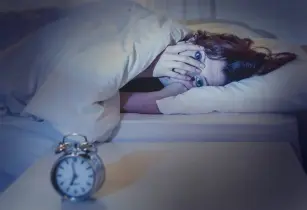
Tossing and turning, glancing at your watch, stress building up because you’re still awake and have to get up for work tomorrow… Are you talking about you? If you often have trouble falling asleep, or you just wake up in the middle of the night and can’t go back to sleep, you probably suffer from insomnia. You can’t function without sleep – just like you can’t function without water, food and air. Where does the problem of insomnia come from?
On average, 1/3 of humanity suffers from this very tiring ailment. Many people ignore this problem and can suffer from incomplete sleep for weeks. There is no need to convince anyone how devastating this condition is – insomnia causes many unpleasant effects:
- Lack of sleep for one day contributes to mood changes, lack of interest in the environment and nervousness.
- Then there are problems with vision and vision: itchy eyes and hallucinations.
- Over time, people suffering from sleep disorders develop difficulties in concentrating, e.g. difficulty in forming a sentence, trouble remembering various events, etc.)
- Aggression is also noted in people who do not sleep for a long time.
- Insomnia increases the risk of developing many diseases: digestive, respiratory, circulatory, urinary, musculoskeletal.
- There is a general decrease in immunity.
- Too little sleep is the cause of cognitive dysfunction, mood disorders, as well as anxiety and can lead to depression.
Sleep is simply essential for well-being, health and proper functioning of the body. However, not only lack of sleep is referred to as insomnia – also waking up too early or poor quality sleep that does not give rest are referred to as disorders. Proper sleep should last at least 6 hours (however, it is worth mentioning that there are people with less need for whom short sleeping time is completely normal). The most important, however, are the subjective feelings of the patient and reporting his problem to the doctor.
There can be many reasons. They can lie both on the side of diseases of the body and the mental sphere. First, of course, you need to rule out any medical conditions that may be causing your sleep problems. Only later may there be a need to see a psychiatrist, and if this does not work – the reason may lie in an inappropriate lifestyle.
More interestingly, women suffer from insomnia twice as often as men (especially those during menopause). Sleep disorders are divided into two categories:
- Intrinsic insomnia – or mental problems. They are difficult to overcome because they are related to emotional disorders, i.e. depression (even seasonal, related to the change of seasons), neurosis, but also other diseases, such as: sleep apnea (common in men over 40!), hyperthyroidism, diabetes, chronic pain, rheumatic diseases, cancer. The solutions are consultation with a specialist, or an independent attempt to deal with mental problems.
- Extrinsic insomnia – that is, related to the so-called sleep hygiene. This case is much easier to solve: just change the place where we sleep. Sometimes we are simply not tired enough, then an evening walk, reading a book in bed or listening to relaxing melodies is enough. The problem may also lie in an uncomfortable bed, noise coming from the street, light coming through the window, or too high temperature in the bedroom.









